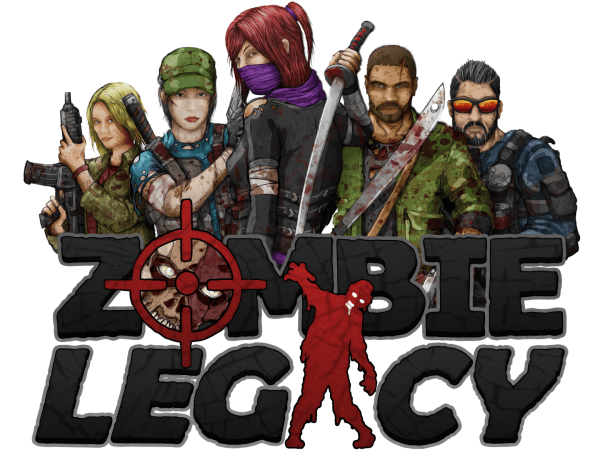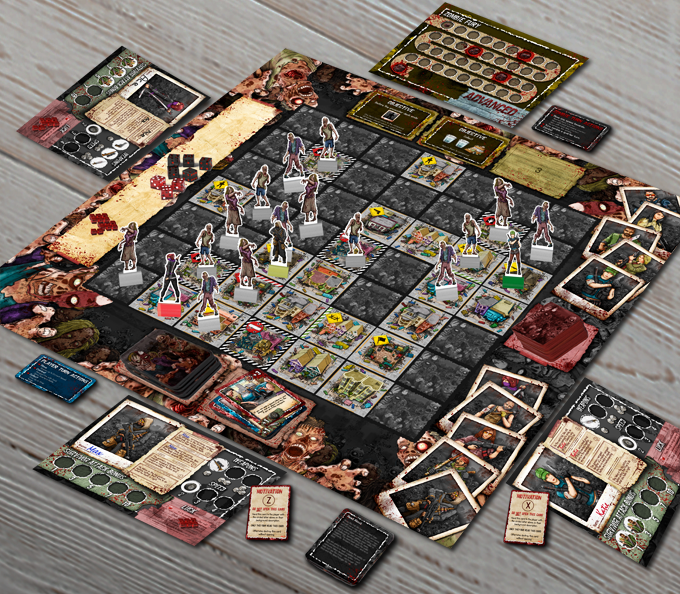What Will Be Your Zombie Legacy? A Kickstarter Preview

Players create their own personal character and take them through the zombie apocalypse in the newest Legacy game, currently on Kickstarter.
Will you play a loner who does what is necessary? Or a mother with a young son who does the best that she can for others? Who will your character be?
Gameplay
If you are unfamiliar with Legacy games, they are designed to include multiple game episodes, each time adding permanent changes to the game components that will affect future play in some way. Once the whole campaign is completed, the game cannot be played again without purchasing a new copy of the game.
The first time you play Zombie Legacy each player creates a character. You are given a player mat and attach a character sticker to it. This is how you look. Next you attach one of three weapons stickers to the weapon tracker. You then create the character’s backstory with the background stickers. This includes how the zombie apocalypse has affected them, something about their family, their job, and finally their morals. The background stickers you can use depend on the number of players and no two players can use the same background sticker. Finally, you choose a luck ability. This can be something such as spend one luck token to add one to a combat roll, or spend two luck tokens to move one extra space on your turn. You can collect up to four luck abilities over the course of the game.
Once everyone has a character, the game begins. The game is run by Legacy decks which you only open as instructed by the game. These decks take you through each scenario, sometimes adding new components to the game or new rules. There are also mystery boxes and packs included in the game which remain closed until the game tells you to open them.
The first scenario has players leaving their base to find food and water. You must explore through the stack of location tiles until you find the ones holding water and food. You must collect those items, and then bring them back to base before the encounter deck is depleted.
Each round, all heroes act first and then the zombies take a turn. On your turn you may move up to your current speed, drawing and placing tiles if you pass through or end your movement on an unexplored location. You must end your movement if you land on a tile with a zombie. After movement comes combat. If you have an item card that allows you to attack at a range and there is a zombie on an adjacent tile, then you may perform a ranged attack. You deal with ranged attacks first (taking no damage if you fail) and then do melee attacks if there is a zombie on your tile. Finally, you can pick up or drop items, and trade with another hero on your tile.
Location tiles have different features. Some have barriers along one side that heroes or zombies cannot cross. Others offer weapons or survivors that heroes can pick up when on that space.
After all the heroes move, the zombies move. They follow several rules to move towards the closest heroes, new zombies spawn on special tile locations, and if a zombie moves onto a space with a hero, combat occurs.
Whenever combat occurs, an encounter card is drawn. If there is no combat icon, the card is resolved, and the zombie is considered defeated. However, if there is a combat icon, there will be a number in the top right corner of the card. This is the bonus which will be added to the zombie’s dice roll. You consult the zombie fury tracker to see how many dice the zombie rolls, roll the dice, and add that number to the bonus for the zombie’s attack.
The attacking hero then rolls one to three dice depending on how many unique weapons her character currently has. How many survivor tokens you have on your player mat also determines your attack bonus. You add your attack bonus to your dice roll and compare that number to the zombie’s attack. Highest number wins, and zombies win ties. Depending on your luck abilities, you may be able to spend luck tokens before or after rolling to affect the result.
If the hero wins, the zombie is removed from the board, the hero gains a luck token, earns any reward listed on the encounter card, and the zombie fury tracker moves up one. If the hero loses, she discards a survivor token. If she is out of survivors, she takes a wound and is incapacitated. An incapacitated hero must be rescued by another player, or revived with a medkit which can be played immediately. Wounds cover up portions of your player mat and carry over between scenarios unless healed. If you ever have five wounds, your character is killed and you get to open the mysterious Hero Death box!
One of the most fascinating and enjoyable aspects of the game are the motivation cards. These cards are included in the Legacy decks and are given to players based on the backstories they chose for their characters. Some motivation cards are kept secret while others are revealed immediately. These can affect the choices your character makes or their abilities.

Review
Zombie Legacy combines two genres currently popular in the board game industry, zombie games and Legacy games, and it does it well. Legacy mechanics fit nicely into an end-of-the-world post-apocalyptic feel of a zombie theme. The permanency of a Legacy game heightens the tension that is already there when facing down against zombies.
The motivation cards are a fantastic addition. They really give you a sense of playing a defined character with his or her own goals and ideals. It makes your character feel more fleshed out and consequently you are more attached to them and have an added incentive to keep them alive. It also reflects the unpredictability of characters in a high stress situation as sometimes these motivation cards will lead a player to make choices that other players, without the motivation card, do not understand. These motivation cards are also not given out all at once, and you are always looking forward to acquiring a new one or seeing another player get one when new decks are opened.
Character creation is a lot of fun in itself, and the history you build for your character as you select from the different backgrounds are far-ranging and interesting. There are also a large number of character pictures to choose from, of both genders. By the time we’d finished creating our characters, we were quite attached to them already.
Part of the nature of a Legacy game is long set up times, so it’s not a quick game to get onto the table, but there are a limited number of components to deal with and both combat and movement is straight forward and easy to grasp, making it a game that can be accessible for casual gamers who don’t mind a bit more heft (or longer game campaigns) on occasion. This makes it a good meeting ground for fans of lighter games to play with those who generally prefer more rule intensive gameplay.
The rulebook needs some refining, as there are a couple of situations that can arise where you are left uncertain or the wording isn’t entirely clear.
An engaging story is built as you go through the Legacy decks, and between that and your character’s own personal story, you create a fun narrative that you want to see through to the end. Plus you always want to know what’s in the next mystery box and when you’ll get to open it! Check the game out on Kickstarter and prepare for the zombie invasion.
Pros: Character creation and motivation cards make you feel invested in the game, relatively easy to learn gameplay for a Legacy game
Cons: Rulebook needs some refining, setup time is lengthy
Disclosure: this preview is based on our evaluation of an unpublished prototype of the game, which is subject to change prior to publication. While a modest payment was received to expedite the review process, our thoughts and opinions expressed here are honest and accurate.




